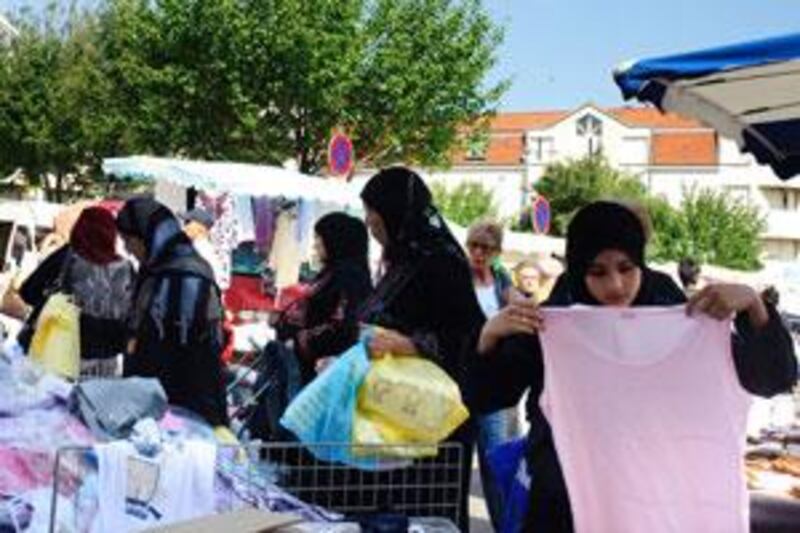VÉNISSIEUX, FRANCE // In his ninth-floor office at the town hall, the communist mayor speaks with equal pride about what he has done for the Muslims of North African origin who account for half the population of Vénissieux - and his role as the politician who pushed France towards a ban on women wearing full veils in public. During 24 years in office, now drawing to a close, André Gérin has overseen the provision of two new mosques, the opening of an acclaimed multimedia library well stocked with works in Arabic and displays of international solidarity, from opposition to war in Iraq to support for a Palestinian state.
But he draws the line at a form of female attire he regards as degrading and oppressive to women, a threat to security and a rejection of the secular, republican values of his country. Having inspired rare unity among the Left and Right with a resolution demanding a commission of inquiry, he won the backing this week of the French president, Nicolas Sarkozy, who devoted part of his historic address to a congress of parliament at Versailles to a declaration that the head-to-toe burqas leaving women "prisoners behind netting" were not welcome in France.
Instead of a commission, the inquiry will take the form of a "mission of information", which government leaders say is better suited to calm analysis of a sensitive subject, though observers still expect legislation as the outcome. Mr Gérin, who also sits in parliament, approved the chosen method and has agreed to join the 32 member-strong mission in defiance of Communist Party opposition to anything associated with a government of the Right.
"There is nothing anti-Muslim in my stance," he insisted yesterday. "I am against those fundamentalists who would use the pretext of religious symbols for different political ends. But I am as opposed to those who are anti-Arab or anti-Islam as I am to anti-semitism, xenophobia and all racism, in which I include being anti-French." Although French Muslims are split on the issue, some see the importance currently attached to it as disproportionate to the extent to which women in burqas and niqabs are actually seen in France. Their main representative body, the French Council of Muslims, also argues that a ban would be inconsistent with France's cherished tradition of championing individual liberty.
In Vénissieux yesterday, no fully veiled women were visible at either the busy market in Place Léon Sublet, named after one of Mr Gérin's 19th century predecessors as mayor, or Les Minguettes, a drab, sprawling estate with a history of Muslim revolt against discrimination and also, on occasions, of anti-French, anti-western incitement. But Mr Gérin, and some stallholders of both French and Algerian origins, said burqas had become commonplace at Saturday markets at Les Minguettes, and at the school gate. Yesterday was a day off for French children but in one recent case mentioned by the mayor, a headmistress was initially reluctant to hand over a child to the burqa-clad "ghost" presenting herself as the mother at the end of a school day.
In only a few cases have women spoken openly about adopting the burqa or niqab in France. Women wearing headscarves, which would be unaffected by any legislation, moved away without response or politely declined to comment when approached by The National yesterday. But one French Muslim convert to Islam, identified as Emma, told TF1 television this week that her full head and body covering was purely her own choice.
"If you take it away from me, you take away my freedom," she said, stressing that she had neither a husband nor brothers to force her to do anything against her will. "I want to go to heaven, not hell. I put up with insults and dirty looks. It is sad, but I will win in the end." An Algerian-born market trader, Hassan Chaoui, who teaches Arabic as well as selling spices, rugs and scents brought from the Middle East and North Africa, defended women's rights to cover their faces. "It is not political, but a question of faith and liberty," he said, observing that politicians frequently saw electoral advantage in seeming tough on Islam.
A few kilometres outside Lyon, one of France's most elegant big cities, Vénissieux is synonymous with the country's uphill battle to assimilate a large immigrant population drawn from former colonial territories. From here in the 1980s, the Beurs - descendants of Algerian immigrants - marched for greater equality. Among the younger generation, however, feelings of estrangement from French society have helped to fuel greater discontent.
Five years ago, several members of the same family were convicted of terrorist offences which included the storage of ingredients for chemical weapons in a flat at Les Minguettes. When a Vénissieux imam was sent back to Algeria as a security threat, media coverage concentrated on an interview in which he had advocated the beating of disobedient Muslim wives by their husbands. The mayor identified a connection between such events and the radicalisation that he believes lies behind an increase in the wearing of burqas, accusing a tiny minority of extremists of influencing the young. "But I believe the vast majority of Muslims simply want to live their lives in peace, harmony and respect for France."
crandall@thenational.ae







